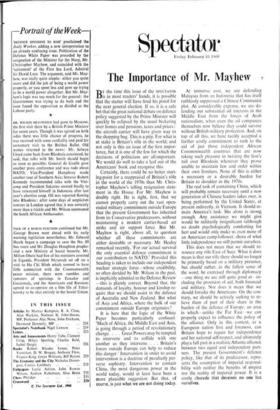The Importance of Mr. Mayhew r B Y the time this
issue of the SPECTATOR is in most readers' hands, it is possible that the starter will have fired his pistol for the next general election. If so, it is a safe bet that the great national debate on defence policy suggested by the Prime Minister will quickly be eclipsed by the usual bickering over homes and pensions, taxes and prices: the aircraft carrier will have given way to the shopping bag. This is a pity. For what is at stake is Britain's role in the world; and not only is this an issue of the first impor- tance, but it is one of the few for which the decisions of politicians are all-important. We would do well to take a leaf out of the Americans' book and recognise this.
Certainly, there could be no better start- ing-point for a reappraisal of Britain's role in the world of the 1970s than Mr. Chris- topher Mayhew's telling resignation state- ment in the House. For Mr. Mayhew is doubly right. He is right, first, that we cannot properly carry out the vast open- ended military commitment outside Europe that the present Government has inherited from its Conservative predecessors, without maintaining a modern carrier-based air strike and air support force. But Mr. Mayhew is right, above all, to question whether all these commitments are either desirable or necessary. Mr. Healey remarked recently, 'For our actual survival the only essential defence commitment is our contribution to NATO.' Provided this heading is taken to include our independent nuclear strategic force—whose credibility, so often derided by Mr. Wilson in the past, is implicitly admitted in the Defence Review —this is plainly correct. Beyond that, the demands of loyalty, honour and kinship re- quire that we should assist in the defence of Australia and New Zealand. But what of Asia and Africa, where the bulk of our commitment outside Europe originates?
It is here that the logic of the White Paper becomes particularly confused. 'Much of Africa, the Middle East and Asia, is going through a period of revolutionary change. . . . Great Powers may be tempted to intervene and to collide with one another as they intervene... . . Britain's forces outside Europe can help to reduce this danger.' Intervention in order to avoid intervention is a doctrine of peculiarly per- verse sophistry. Intervention to contain China, the most dangerous power in the world today, would at least have been a more plausible suggestion. But that, of course, is just what we are not doing today. At immense cost, we are defending Malaysia from an Indonesia that has itself ruthlessly suppressed a Chinese Communist plot. At considerable expense, we are de- fending our substantial oil interests in the Middle East from the forces of Arab nationalism, when even the oil companies themselves now believe they could survive without British military protection. And, on top of all this, we have tacitly accepted a further costly commitment to rush to the aid of just those independent African Commonwealth countries that are now taking such pleasure in twisting the lion's tail over Rhodesia whenever they prove unable to maintain law and order within their own frontiers. None of this is either a necessary or a desirable burden for Britain to shoulder in the 1970s.
The real task of containing China, which will probably remain necessary until a new generation of Chinese leaders takes over, is being performed by the United States, at present indirectly, in Vietnam. It should re- main America's task. She alone is strong enough. Any assistance we might give would be militarily insignificant (although no doubt psychologically comforting for her) and would only make us even more of an American camp-follower, shorn of what little independence we still permit ourselves.
This does not mean that we should re- nounce any role East of Suez. What it does mean is that our role there should no longer be primarily based on a military presence, but should rather, in the fullest sense of the word, be exercised through diplomacy —one thing we are still quite good at—in- cluding the provision of aid, both financial and military. Nor does it mean that we should forsake the Americans. On the con- trary, we should be actively seeking to re- lieve them of part of their share in the burden of the defence of Europe, an area in which—unlike the Far East--we can properly expect to influence the policy of the alliance. Only in this context, as a European nation first and foremost, can Britain hope to regain her independence and her national self-respect, and ultimately playa full part in a realistic Atlantic alliance between two equal and independent part- ners. The present Government's defence policy, like that of its predecessor, repre- sents the assumption of imperial responsi- bility with neither the benefits of empire nor the reality of imperial power. It is a costly charade that deceives no one but ourselves.


































 Previous page
Previous page